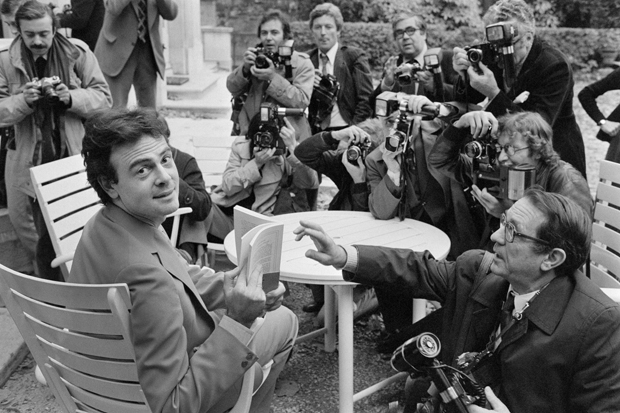Earlier this year Patrick Modiano won the Nobel Prize in Literature ‘for the art of memory with which he has evoked the most ungraspable human destinies and uncovered the life-world of the Occupation’. A prolific and celebrated novelist in France, Modiano is not well known in Britain or America, where only a third of his works have been translated and many are out of print.
Yale University Press has a coup in these circumstances with Mark Polizzotti’s translation of three of Modiano’s novellas, commissioned before the Nobel announcement. The novellas originally appeared over five years: Remise de peine (Suspended Sentences) 1988; Fleurs de ruine (Flowers of Ruin) 1991; and Chien de printemps (Afterimage) 1993. In his introduction Polizzotti explains that the third title — literally ‘dog of spring’, figuratively an expletive meaning rotten or miserable spring — has been freely translated.
The novellas are discrete and discontinuous but remarkably coherent. They are structured like detective stories but offer no resolution. Instead they investigate the shape of memory, probing moral and historical complexity with spare, finely honed prose. Set in or close to Paris, each is narrated in the first person by a character closely resembling the author, and all are haunted by the Occupation and Holocaust. Modiano describes his fiction as ‘a kind of autobiography, but one that is dreamed-up or imaginary. Even the photographs of my parents have become portraits of imaginary characters.’
A mysterious photographer who left France in 1964 is the absent centre of Afterimage. Almost 30 years later, the narrator remembers meeting Francis Jansen with his Rolleiflex in a café on Place Denfert-Rochereau and offering to catalogue his archive of images, dating back to the 1940s. The youthful narrator thought the pictures had documentary value since they bore witness to people and things no longer extant. But Jansen, who once obsessively dated his work and recorded the names of his subjects, had completely lost interest in it by 1964: ‘You understand, kid, it’s like every one of those pictures was a kind of guilty conscience for me… It’s better to start from scratch.’
The narrator tries to piece together Jansen’s biography and discovers that, like Modiano’s father, he was picked up in a raid under the Occupation and interned as a Jew at the Drancy transit camp. Like Modiano’s father, he was rescued, remained in Paris after the war and withdrew further and further into himself: ‘All that remained for him were vague reference points and hazy silhouettes.’ Gradually the narrator, and the reader, come to understand Jansen’s photographs. ‘[He] tried to capture an entirely rural aspect of Paris: curtains of trees, canal, cobblestones in the shade of plane trees, the clock tower of Saint-Germain de Charonne, the steps on Rue des Cascades… He was seeking a lost innocence.’
Modiano’s Paris is beautiful, baleful, disappearing. Particular places recur with unshakeable atmospheres. In After-image the narrator remembers, ‘we crossed Place du Panthéon, sinister in the moonlight, which I never would have dared cross alone.’ In Flowers of Ruin another narrator records the same sentiment: ‘In front of me, the dome of the Panthéon. It frightened me to be there alone, at the foot of that funereal monument in the moonlight, and I veered off into Rue Lhomond.’ This novella centres on the mysterious double suicide of a young recently married couple at No. 26, Rue des Fossés-Saint-Jacques, near the Panthéon. The case is macabre, but the dread the narrator feels emanates from the mausoleum with its motto: Aux grands hommes, la patrie reconnaissante (‘To the great men, the grateful homeland’).
Flowers of Ruin also evokes the Cité Universitaire: ‘That neutral zone, at the very edge of Paris, gave its residents diplomatic immunity.’ In the 1960s, the narrator and his girlfriend obtained fake student ID so they could eat cheaply in the cafeteria: ‘When we crossed the border with our fake identity cards, we were safe from all harm.’ In this seemingly liberal atmosphere, the narrator remembers researching the double suicide, scanning the indexes of old newspapers ‘like a ragman poking his hook into a pile of garbage’. The trail leads him to puzzle at ‘the fate of a man wanted for colluding with the enemy, who might or might not have survived the Dachau concentration camp’, and ultimately back to thinking about his father, ‘who had weathered all the contradictions of the Occupation period, and who had told me practically nothing about it before we parted forever’.
Childlike bafflement is even more sharply focused in Suspended Sentences, where two young children have been left by their parents to live with friends in a small town outside of Paris. They spend a lot of time playing in the garden while mysterious adults come and go from the house: ‘Hidden at the back of the first terrace, under a clematis, was the grave of Doctor Guillotin. Had he lived in that house? Was it where he’d perfected his device for severing heads? At the very top of the garden were two apple trees and a pear tree.’





Comments